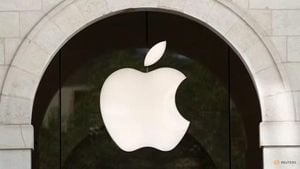Misinformation surrounding the health of King Mohammed VI of Morocco has taken center stage, sparking widespread concern and confusion online. Over the weekend, social media platforms were flooded with posts falsely claiming the monarch had passed away.
Specifically, these misleading posts surged on platforms such as Facebook and X (formerly Twitter) Saturday evening, coinciding with a significant spike in searches for the king's name. Reports indicated over 77,000 mentions of King Mohammed VI within just three hours of the misinformation’s spread, signaling what some analysts believe is indicative of a coordinated disinformation campaign.
The misleading narratives primarily cited fake headlines and fabricated statements attributed to Hespress, one of Morocco's prominent news outlets, claiming it had reported the king's death. Such claims gained traction rapidly, with many users sharing the fabricated posts without verification.
Reassuringly, CNN Arabic reported, "The Moroccan Royal Palace has not announced the death of King Mohammed VI," firmly dispelling the rumors circulating. This statement highlights the importance of consuming and disseminate information responsibly, particularly concerning the health of high-profile figures.
While there was no official statement from Moroccan authorities concerning the king's health, the posts created alarm among citizens and sparked waves of speculation. These events occurred against the backdrop of the most recent official announcement from the Moroccan Royal Palace, which was dated December 23, 2024, and did not mention any health issues.
Later, Hespress addressed the issue directly, stating, "Hespress continues to be implicated in the dissemination of false news without any basis through social media," indicating the media outlet’s awareness of its identity being exploited by false narrators online. They went on to assert, "Hostile parties to Morocco are spreading false news targeting a constitutional institution," expressing concern over the intent behind the fabrications.
What makes this episode particularly significant is the alarming ease with which false information travels on social media. While the swift relay of information can be beneficial, it can equally pose risks when the information is unfounded. Examples from this incident, where social media users drew on familiarity with the format of reputable news to lend credence to their false claims, raise questions about how individuals can be misled.
This situation also compels media producers, as well as consumers, to promote authenticity and accuracy across platforms. Social media users are now more encouraged than ever to verify information before sharing it, recognizing the potential damage done when misinformation leads to unnecessary panic or confusion.
For the citizens of Morocco, the health of their king is not just political news; it's personal. King Mohammed VI has been the country's monarch since 1999, and his leadership has shaped modern Moroccan society. Such rumors can provoke not only distress but public outcry, making responsible reporting and fact-checking more pressing than ever.
Following the incident, researchers and analysts on disinformation are reiterative on the need for improved digital literacy among social media users. They recommend practices such as thoroughly examining sources, being skeptical of sensational claims, and reaching out to established news agencies for confirmation during crises.
This entire episode serves as a stark reminder of the volatile nature of information sharing today. The blending of fact, speculation, and outright deception creates challenges for individuals and institutions alike, where the line between accurate reporting and dangerous misinformation often seems blurred.
Consequently, the failure to address and counteract such misinformation swiftly can undermine trust among the public and destabilize perceptions of the monarchy itself. It paints not just King Mohammed VI as misrepresented; it highlights the larger struggle faced by nations seeking to tackle misinformation effectively.
To conclude, the recent circulation of misinformation concerning King Mohammed VI's health is more than just another falsehood online; it's emblematic of the heightened challenges societies face amid the digital age. Going forward, the incident perhaps acts as both cautionary tale and incentive for intensified efforts aimed at promoting accurate information, reminding individuals and institutions to remain vigilant against the swirling tide of misinformation.



